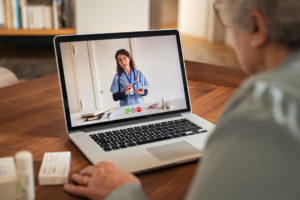
Why did you choose to become an Editorial Board Member for the journal?
Mike Conway (MC), University of Melbourne, Australia – Being an Editorial Board Member for BMC Digital Health provides an exciting opportunity for me to contribute and influence the burgeoning field of digital health, particularly as it relates to my own research interests in health-related natural language processing and bioethics.
Philippe Giabbanelli (PG), Miami University, USA – BMC Digital Health is an exciting opportunity to continue the editorial work that I am doing with related journals into a growing domain that also connects with my research. BMC titles are well-managed, have a solid reputation in the field, and the editorial platform is modern so being part of the editorial board for this journal is the right vehicle to contribute to shaping the field.
Jannik Schaaf (JS) Institute of Medical Informatics, Goethe University Frankfurt, University Hospital Frankfurt, Germany – To give something back to the scientific community and to collect experiences in publishing.
Octavio Rivera (OR) Universidad de Sevilla, Spain – I like to develop new skills and learn new knowledge. Becoming an Editorial Board Member allows me to learn about the editorial process and gives me the opportunity of knowing and handling the latest research in the digital health field. Additionally, it allows me to make new contacts in the digital health research community. However, most importantly, BMC offers this opportunity by betting on making high-quality scientific work visible beyond its potential impact. Being an Editorial Board Member, I feel that I can help the scientific community to make research visible and thus contribute to the advancement of digital health.
Andrew Boyd (AB) University of Illinois Chicago, USA – Digital health is emerging as a new domain within healthcare, the importance of journals is critical in evaluating the success and failure of innovation to help transform health.
Alessia Paglialonga (AP) National Research Council of Italy (CNR), Italy – Interest in the topic area, interest in supporting dissemination and exchange in the field, excellent publisher’s reputation, and the challenging aspects of contributing to a new journal launch.
What are your research interests and how do they link to digital health?
 PG – I have worked for over ten years on computational public health, by developing and applying models to identify effective policies in application areas such as suicide, obesity, HIV, and COVID-19. In addition to the historic strengths of my group in machine learning and simulation, virtual reality (VR) is playing an increasingly important role. For example, we use VR to help interdisciplinary teams design and understand models.
PG – I have worked for over ten years on computational public health, by developing and applying models to identify effective policies in application areas such as suicide, obesity, HIV, and COVID-19. In addition to the historic strengths of my group in machine learning and simulation, virtual reality (VR) is playing an increasingly important role. For example, we use VR to help interdisciplinary teams design and understand models.
Smaranda Belciug (SB), University of Craiova, Romania – My research interests regard artificial intelligence applied in cancer diagnosis, treatment, survival analysis and congenital anomalies in fetuses.
OR – Participatory health informatics and persuasive technology (particularly, in personalization of digital health solutions). My research is focused on how to conceive, design, test, and use technology for improving health experiences. Therefore, it is completely aligned with digital health.
AB – My research is data simplification to improve clinical outcomes. This applied digital health journal would be a great venue for this applied research.
Elia Gabarron (EG) Norwegian Centre for E-health Research, Norway – My main interests are centered around the use of social media for health, participatory research, and especially the role of digital technologies for preventing conditions and in supporting people living with conditions or disabilities.
AP – My main research interests are in the area of AI for health modeling and disease prevention, mHealth apps characterization and assessment, and eHealth platforms – main and interrelated components of digital health
What would you consider the “hot topic” research areas in digital health at present?
MC – Hot topics for me include work on the potential uses of powerful new language models to develop and enhance clinical natural language processing, with the goal of supporting both epidemiological research and clinical decision support.
PG – Virtual reality is a hot topic in digital health, particularly as the cost and usability of headsets has massively improved over the recent years. Devices provide immersive experiences to simulate real-world scenarios (e.g., to train medical practitioners) and new collaborative spaces for teams that seek to design complex interventions. I am particularly excited about the use of virtual reality for mental health, as there are important research questions such as how to create a rapport with a ‘virtual’ practitioner.
SB – I think the healthcare revolution starts with more and more artificial intelligence applications in the healthcare system.
The role of social media and artificial intelligence in connection to healthcare are very hot topics: Elia Gabarron, Norwegian Centre for E-health Research, Norway
OR – Nowadays, there are several trending topics in digital research, however, it could be said that many of them are related to 5P medicine: Participatory, predictive, preventive, personalized, and precision. Regarding predictive, preventive, and personalized medicine, we are living in the data era. We have a huge amount of data, particularly health data, and therefore, AI and its related themes are still trending. Collecting, saving, processing, managing, analyzing, and exploiting health data ensuring security, privacy, interoperability, etc. are interesting research topics in the digital health field. Although these topics have been researched for long time and they have significantly advanced, there are still many research gaps. Some examples could be developing AI models more understandable for non-experts (real users), incorporating real-time data collected in real-life scenarios, developing technological tools supporting in the personalization of treatments/therapies, etc. Regarding participatory health, there is currently a growing interest in patient experience, health equity, and privacy when technology is applied to the health domain. Finally, new technologies such as those used in Meta-verse enable innovative health interventions, especially in psychotherapy and patient education, that currently are demonstrating to have promising benefits. Digital twins, avatars, virtual reality, augmented reality, mixed reality, etc. have been used in health research, especially in rehabilitation and education. However, there are still trending topics.
Daniela Haluza (DH) Medical University of Vienna, Austria – Telemedicine and remote patient monitoring, which have become increasingly important during the COVID-19 pandemic, aArtificial intelligence and machine learning, which have the potential to improve diagnosis, treatment, and overall healthcare delivery, Digital therapeutics, which are software-based interventions that can be used to treat or manage various conditions. Digital health data privacy, security and trust.
EG – The role of social media and artificial intelligence in connection to healthcare are very hot topics.
AP – Some current challenges in the area involve AI-powered decisions, for example. regulation, certification, and validation. Other hot topics are patient-centered digital health design and integration of multiple platforms.
How do you see the field developing in the future?
 PG – Digital health has long held the promise of making medicine more personalized and precise, while providing cost-efficient ways to deliver healthcare at scale. Given advances on both the algorithmic side (e.g., improvements on the explainability of models) and hardware components (e.g., more widely available headsets), the use of digital health is poised to be more widely available and shift from its historical training-role into an intervention-focus.
PG – Digital health has long held the promise of making medicine more personalized and precise, while providing cost-efficient ways to deliver healthcare at scale. Given advances on both the algorithmic side (e.g., improvements on the explainability of models) and hardware components (e.g., more widely available headsets), the use of digital health is poised to be more widely available and shift from its historical training-role into an intervention-focus.
SB – As more and more doctors and researchers engage in this field, more data will become available, leading to more studies being published. I hope that most of these studies will find their way into clinical practice. For this to happen, researchers all over the world should start focusing in building up confidence in this area.
JS – Digital health will be an essential part of medical care in an aging society and will complement traditional care, especially in rural areas.
OR – Digital transformation of the health sector and advancements of technology will enable new healthcare scenarios in which technology will play a crucial role in the support of health management. I think that research will mainly focus on two areas in the short and medium term: Generating evidence on effectiveness of 5P digital health, and the development of less invasive, interoperable, easy to use and understandable, accessible, and personalized health technology.
DH – In the future, I see the field of digital health continuing to grow and evolve, with a greater emphasis on the integration of technology into all aspects of healthcare. This will likely lead to more personalized and efficient care, as well as improved outcomes for patients.
AP – Through more collaboration between engineers, medical doctors, patients, healthcare administrators, and regulatory bodies
What role would you like to see BMC Digital Health play in the future of digital health?
PG – By creating collections on important topics, BMC Digital Health is attracting attention to some of the most important topics of digital health, thus contributing to shaping research in important areas. I would like to see representatives from BMC Digital Health involved in key conferences, for instance with sufficient sponsoring to get a booth, such that the community is aware of this new outlet and considers it for their work.
By creating collections on important topics, BMC Digital Health is attracting attention to some of the most important topics of digital health, thus contributing to shaping research in important areas. I would like to see representatives from BMC Digital Health involved in key conferences, for instance with sufficient sponsoring to get a booth, such that the community is aware of this new outlet and considers it for their work: Philippe Giabbanelli, Miami University, USA
SB – I would love to see that the published studies found their way from the lab to the real world and clinical practice.
JS – It would be great if BMC Digital Health develops into one of the leading journals in the field of digital health. I would like to contribute to this as an editorial board member.
OR – I would like BMC Digital Health to be considered as a reference journal by the scientific community researching digital health. I would like BMC Digital Health to promote research on relevant topics such as how to use technology to achieve universal health coverage and/or health equity.
DH – As for the role of BMC Digital Health, I see it playing a significant role in driving research and innovation in the field, by publishing high-quality studies and articles on digital health topics, and providing a platform for the exchange of ideas and knowledge among researchers, practitioners, and policymakers. Additionally, it could also play a role in fostering collaboration and partnerships between academia, industry, and healthcare organizations to facilitate the development and implementation of digital health solutions.
AB – As an open source journal the ability to share and have widespread distribution of the research findings is critical.
EG – I am sure the journal will become one of the top leading journals in the field.
AP – Bridge research and clinical practice, support the growth of a cross-disciplinary community
Comments